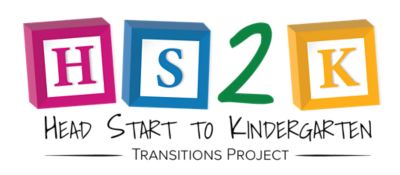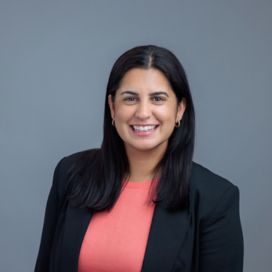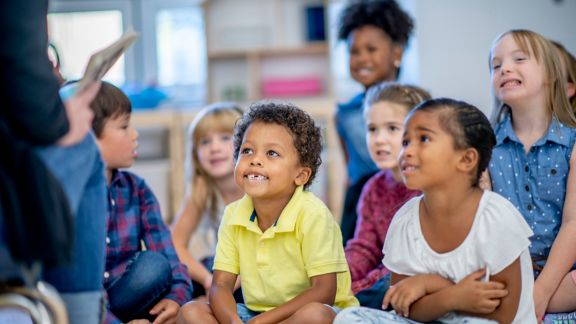Head Start to Kindergarten Transitions: Foundational Research

Problem
Too many children struggle when moving from Head Start to kindergarten.
The start of kindergarten is a major milestone in the lives of children and their families. Head Start and other ECE programs engage and nurture children. But if children and families don’t continue receiving the right support during the transition to kindergarten, much of that momentum will be lost. The inherent challenge is that Head Start programs and kindergartens sit within two different systems and may have different approaches to preparing children for elementary school. Bridging the gaps requires extraordinary cooperation at the systems level.
Existing research generally focuses on the role of teachers in easing the pre-K to kindergarten transition, but not enough is known about how the K-12 districts and early childhood education programs themselves help or hinder the process. And while there are federal and state laws requiring coordinated efforts to support children’s Head Start to kindergarten transition, there is little research or data on how such efforts are implemented.
If we can improve the transition to kindergarten for children graduating from Head Start, those insights will help all children become strong elementary school learners.
Solution
NORC built a trove of research on how systems can collaborate to strengthen kindergarten transition supports.
To better understand how to improve children’s transitions from Head Start to kindergarten, the Office of Planning, Research, and Evaluation (OPRE) contracted with NORC at the University of Chicago to:
- Study how much Head Start programs and elementary schools communicated
- Detail what programs and policies were in place to ease the transition
- Identify the characteristics of successful partnerships
Because of the scope of the project, NORC recruited three partners:
- Child Trends, a national research organization focused exclusively on children
- the National P-3 Center, a University of Colorado Denver program focused on this transition period
- Kyle DeMeo Cook, PhD, an assistant professor at St. John’s University and nationally recognized expert on the issue
NORC’s own considerable expertise in early care and education and its ability to quarterback a national team of experts proved a major selling point for federal officials.
The onset of the pandemic in early 2020 delayed data collection by a year. NORC adapted by conducting interviews online and taking extra steps to alleviate the study’s burden on subjects as much as possible.
Our top-to-bottom study included:
- An extensive review of existing knowledge, including a literature review and qualitative interviews with a variety of experts and perspectives
- Case studies describing cross-system efforts to collaboration and support kindergarten transitions
- A theory of change for kindergarten transitions, highlighting the cross-systems approaches to promote positive outcomes for children, families, and teachers
Result
Head Start helps prepare children for kindergarten, but without a smooth transition some academic, social and emotional benefits get lost.
NORC and our partners presented new case studies, tools and analyses for decision-makers and researchers. Combined they offer a new way to ensure children in Head Start maintain their momentum in kindergarten: By encouraging leaders of both education systems to collaborate more.
We found that supporting transitions require intentional engagement strategies from both the sending and receiving programs. And those strategies must involve not just classroom teachers but also families, school principals and district officials, Head Start directors and grantees, and state and federal agencies.
Our report with OPRE, “Understanding Cross-Systems Transitions from Head Start to Kindergarten: A Review of the Knowledge Base and a Theory of Change,” identified critical gaps in our understanding of the transition process and outlined a system-level framework for bridging those gaps.
The Head Start-to-Kindergarten Transitions (HS2K) project also provides a solid foundation for future research, allowing for even more in-depth study of the complex relationships at play and giving policymakers and educators the information they need to make this key transition in a child’s education as seamless as possible.

Learn More About the HS2K Project
For more information about the Head Start to Kindergarten (HS2K) Transitions Project, visit the Office of Planning, Research, and Evaluation (OPRE) website.
Related Tags
Project Leads
-
Marc Hernandez
Associate DirectorPrincipal Investigator -
Lekha Venkataraman
Senior Research DirectorSenior Staff -
Molly Gordon
Senior Staff -
Carol Hafford
Senior FellowSenior Staff -
Cristina Carrazza
Research ScientistTask Lead -
Mitchell R. Barrows
Research ScientistProject Manager
Published Research
-
opens in new tabHead Start to Kindergarten: It Takes Two (Systems)
Research Brief | December 14, 2023
-
"Understanding Cross-System Transitions from Head Start to Kindergarten: A Comparative Cross Case Study of Head Start and K-12 Partnerships"
Project Report | September 1, 2023
-
Systems-Level Strategies to Facilitate Kindergarten Transitions: Key Study Findings and Examples from Case Studies of Head Start & K-12 Partnerships
Research Brief | September 1, 2023
-
opens in new tabHS2K Head Start to Kindergarten Proximity Map
Map | August 22, 2023
-
opens in new tabStudying Combinations of Kindergarten Transition Activities Available to Children and Families
Research Brief | November 30, 2022
-
opens in new tabFacilitating Kindergarten Transitions: The Role of Memoranda of Understanding (MOUs) between Head Start and Local Education Agencies
Research Brief | November 2, 2022
-
opens in new tabDesign Options for Head Start to Kindergarten Transitions Descriptive Study
Project Report | October 19, 2022
-
opens in new tabSupporting Transitions in Migrant and Seasonal Head Start
Research Brief | September 29, 2022
-
opens in new tab"Understanding Children’s Transitions from Head Start to Kindergarten: A Literature Review and Theory of Change."
Project Report | November 3, 2021













